
by Kasia | Apr 3, 2017 | Writing
Consistency. My word for 2017.
The first quarter of 2017 is done and dusted and I’m curious to know where you’re at with your goals, your dreams, your day to day life. Are you living intentionally and enjoying every moment? Are you working to achieving the life of your dreams? Or are you still stuck in a spiral of failure that’s your own doing?
I hope it’s the former.
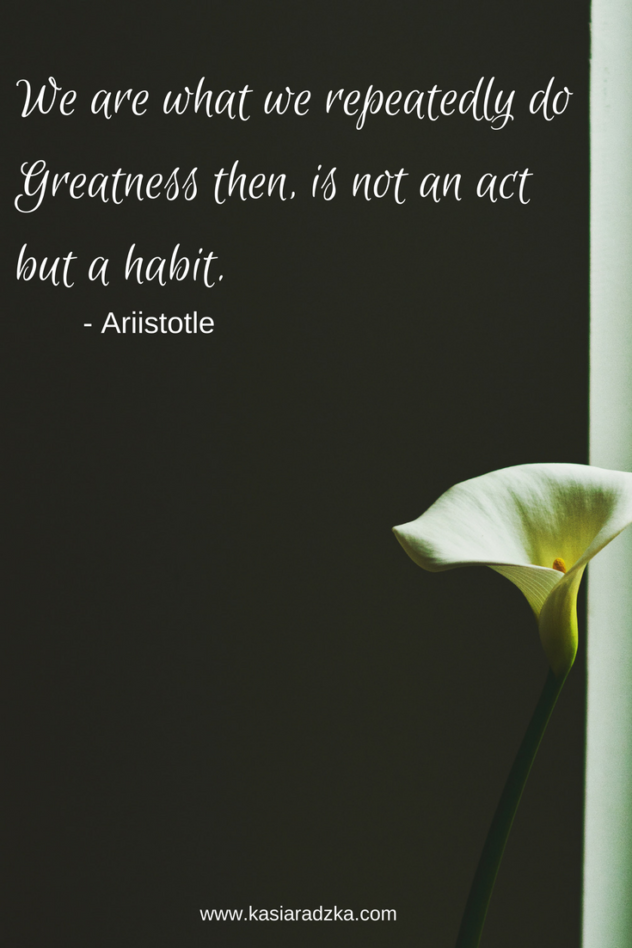
We’re well into 2017 but I feel like I still haven’t gotten my bearings. The past few months have been everything but consistent.
I make plans. They turn to shit.
I set goals. Obstacles emerge.
It’s frustrating as fuck and driving me crazy.
Consistency is a key to success in anything whether you’re trying to run a marathon, write a novel, grow a business, maintain an awesome relationship, lose weight or save for a house deposit.
Life doesn’t always go according to plan and it’s easy to give up on your dreams arguing that it’s just too hard or not meant to be. Bullshit. It’s you.
Yes, sometimes we draw the shit card. So what? That’s not a reason to fall into a cycle of a zombie like state and waste our life away by living groundhog day and ignoring the fire that burns inside.

HOW TO STAY CONSISTENT?
1. Quit the excuses
Excuses are too easy and too often we let them get in our way of achieving our goals and dreams faster.
Almost anything is possible, if we are willing to put in the effort to get it.
But excuses are debilitating. They lead to unhappiness. Dissatisfaction. Regret. Blame.
None of these are conducive to creating the life of your dreams.
If you don’t feel like doing something, do it anyway, even if it’s just for ten minutes.
Chances are that you’re going to keep going.
And remember, you’re always going to feel better having ticked off the item from your ‘to do’ list then if you made an excuse and put it off for tomorrow.
Just do it. It’ll help keep you consistent.
2. Figure out what you want
What is that you really want out of life? Is it to spend the majority of your life stuck in a cubicle making someone else rich?
Or maybe you’d prefer to travel the world, get up early or stay up late, spend more time with the kids, or just your dog without having someone else dictate your worth?
Maybe you like working but have always wanted a different career that offers flexibility and allows you to look forward to Mondays?
Once you can clearly see what it is that tickles you fancy, it’s going to be much easier to stay consistent and turn your dream life into reality.
3. Set clear goals with an action plan
Consistency requires that you have goals and action steps in place.
It’s easy to say, ‘I want so and so, but much harder to achieve if you don’t have a plan.
So many people say, I’m going to write a book or I’m going to lose fifteen kilograms or I want to travel the world.
The problem is they don’t make it a goal, they don’t create action steps that will ensure they will meet their objectives.
Writing a book for example is simple.
It’s not easy.
Once you’ve come up with your story kernel you have to keep your reader entertained for about 80,000 words through conversations, action scenes, recoveries, ups and downs before drawing them to a satisfying conclusion.
It’s tough.
But you can do it.
How?
“When asked, “How do you write?” I invariably answer, “One word at a time,” and the answer is invariably dismissed. But that is all it is. It sounds too simple to be true, but consider the Great Wall of China, if you will: one stone at a time, man. That’s all. One stone at a time. But I’ve read you can see that motherfucker from space without a telescope.”
― Stephen King
One word at a time as Stephen King would put it.
Start with one word. One sentence. One paragraph. One page.
Write a page a day and you’ll have a novel by the end of the year.
Write 2500 words a day and you’ll have a book by the end of the month.
Simple, isn’t it?
And it all comes down to consistency.
4. Make it a habit
Do anything for long enough and it’ll be come a habit.
Through consistent behaviour humans are capable of transforming themselves from fat slobs to fitness fanatics, from bankruptcies to riches, from dreamers to individuals living out the ‘impossible’.
But habits and consistency take effort.
Most of us are more likely to sway towards taking the easy route. Humans don’t like pain. Pain hurts.
But there are a few of us who are willing to push through. Push past the barriers. Jump over the hurdles, and achieve our wildest dreams.
We’re all capable of it, but we’re not all going to do it.
Which group are you going to fall into?
5. Don’t rush
Success in life isn’t a sprint. It’s a marathon.
If we rush certain things, we increase the chances of mistakes that can hinder our progress and results.
You’re not going to train for a marathon in a week if you’ve never run more than 100m chasing the bus of a morning.
You’ll start slow. Aim for running 1km. Then 5km. Then 10km. Then 20k. Finally you might consider the long one.
It might take you six months, it might take you two years.
It doesn’t matter.
The journey matters as much as the destination, sometimes even more so.
Stay consistent and you’ll enjoy the journey and reach a much sweeter destination.
6. Take responsibility
Your life. Your doing.
We get to a point in our lives where our choice have long-term consequences. It’s when we start blaming others for our problems that shit hits the fan and life doesn’t go to plan.
To be successful in whatever you’re doing is to take responsibility for the good and the bad. That means owning up not just to your success but also to your failures and then working towards self improvement every single day.
The only person responsible for not having the life you want is you.
You make consistent choices every day. These choices come with ramifications.
If you’re consistent with turning up late for work every day, well it shouldn’t be a surprise if your boss gives you a final warning.
If you’re consistent with sitting on the couch watching three hours of television each night whilst binging on a box of biscuits, it’s no wonder you can’t do up the top button of your jeans.
If you’re consistent with picking up after yourself then you know that your home is always going to be clean.
If you’re consistent with your savings, it shouldn’t be a surprise when your bank account hits six figures.
Work towards your goals, whatever they may be, with consistent effort and you will get there sooner rather than later. One day you will wake up and realise you have created your own success. Go out and celebrate.
HOW AM I GOING TO STAY CONSISTENT IN 2017?
So this year I’m focusing on consistency. There are three things that are important to me and I want to continue to improve on:
Books
Blogging
Training (Running, Cycling, Swimming)
The only way to be successful at anything is to be consistent with your efforts.
My goal is to eventually be a full-time author. Consistency means working on my books every day. This includes writing, editing, research and brainstorming.
I enjoy blogging. Maybe it’s the instant gratification thing. I’m going to aim for two blog posts per week. Stay tuned!
Training is important to me. I love taking part in triathlons and running events. This year I’m aiming to compete in a few. So, in order to achieve this I need to be consistent with my training. That means 5-10 hours of training per week. No excuses.
Consistency is key.
HOW DO YOU STAY CONSISTENT? WHAT ARE YOU DOING TO GET CLOSER TO LIVING LIFE ON YOUR TERMS?
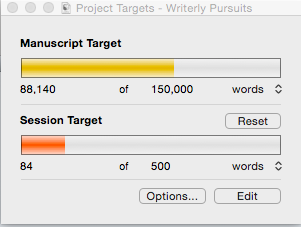
by Kasia | Mar 26, 2017 | Writing
Have you heard of Scrivener?
It’s a piece of software made especially for writers. Scrivener has been around for some time now and it can change your writing forever. You can check out a post I did here about how Scrivener improved my writing and made me more productive.
I use Scrivener every day for both my fiction and non-fiction and I’m still learning all the awesome functionalities available. Here are just some of the awesome capabilities the software has and it’s just scratching at the surface.
1 – Project Targets
I love numbers. So when I write I like to track what I’m doing. Scrivener has a Projects Target box where you can set the amount of words you want to write in your project (novel, non-fiction book, article, blog post, essay, etc), as well as a session target. The bar changes colour from a red to a green the closer you get to your target number of words.
While this can be distracting for some it’s motivating for others. The box doesn’t have to be open you can check it from time to time without having to look at it constantly too.
This function is especially useful if you’re doing NANOWRIMO and need to keep track of your words or you simply have a goal to achieve each day. I’ve been testing myself by aiming to write 100 words between each train station on the way to work. I generally surpass it (there’s 3-5 minutes between stations).

2 – Project Statistics
Gives you the stats about your entire project within the file. You can change certain parameters but it tells you the things you want to know about your project.
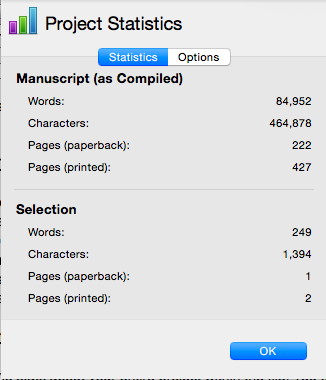
3 – Text Statistics
I only discovered this function recently and it’s helping me become a better writer.
I can see which words are being used more often than others in a chapter which can reduce the risk of repetition. It’s perfect for checking how many passive words you use and choosing alternatives.
To keep readers engaged it’s important to write in an active voice and avoid using ‘was’, ‘been’, ‘had’, especially when writing a novel.
But when you’re rushing through a scene it’s easy to get lazy.
Checking out your word frequency and ensuring that you use a variety of words and avoid passive language as much as possible will make your writing stronger and more pleasant to read.
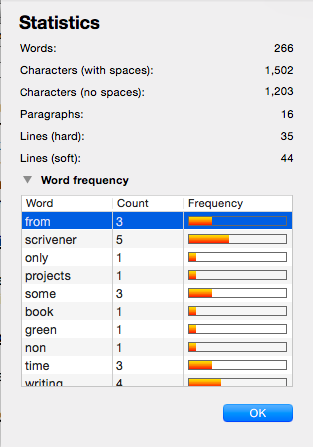 

4 – The Binder
The layout of Scrivener is visually appealing. While you can have just the writing screen open, I like having the binder and the comments section available at all times.
The binder allows me to organise my writing. I use it for writing fiction (three books using the software so far, and I’m still learning about its abilities), as well as non-fiction.
I use folders to separate the different non-fiction projects. I have this blog, as well as a personal finance blog and I’m working on an e-course and a non-fiction book for writers. If I get stuck on one project I move on to the next and because the binder is right there, I can move from one to the other without a hitch or wasting time searching through folders.
When writing a fiction novel, it’s easier to reorganise chapters without having to go through cutting and pasting. And sometimes reorganisation is a necessity.
5 – It’s all in one spot – research, writing, notes
When you write you want to have your research and notes all in one spot. Scrivener allows you to do that.
I use the comments section quite often to ensure that instead of starting and stopping with me writing I just put in a comment to check a resource, find an answer to a question, do some extra research, etc.
6 – Helps me stay organised
As mentioned above, organisation is important for a writer.
Time is limited and often we need more of it.
The less time you spend looking for things and shuffling through your work the more words you can get down on paper.
There’s no scrolling and searching. Everything is neatly set out. You can jump from chapter to chapter, scene to scene, and not get lost. The only thing you do get lost in is the world that you’re creating!
7 – Formatting for Kindle and epub
Formatting can be a pain in the backside. With my first novel I actually paid someone to do the formatting for me. Which is fine. You can find businesses that will format your book for you and charge you anywhere from $100+ for their efforts.
Scrivener can do it for you without charging you any extra than what you paid for it. Once you buy the software (only $45US). It’s yours to use forever and it’s available for Mac and Windows and now even the IPhone and IPad. Awesome.
You can compile your document and export it to Kindle, epub, print, novel format, draft format and several others. You do need to fiddle with the options to get what you want the first time you do it but then with each book after you know exactly which settings to use and you don’t need to be spending a hundred or more dollars on getting your book formatted. It works for fiction and non-fiction.

8 – You can Import files from your computer and the internet
Scrivener allows you import files from your computer and the world-wide web. Did you find a piece of research that you want to use in your next book? Fantastic, you can save it to Scrivener so you don’t have to waste time searching for it again and having to open extra screens.
How about pictures?
Scrivener will hold your images for you too.
If you’re writing a novel you might have a section for your characters. You can find a picture that resembles the character in your story and add it in. The same goes for your setting.
9 – It saves your work automatically
Are you paranoid about losing your work? Scrivener automatically saves your work eery few seconds which is great for writers who forget to click save regularly.
When you hit delete. The work goes into the trash but it’s never completely deleted until you go in and empty the trash can. That means if you accidentally delete an article or chapter you can retrieve it.
10 – It has a useful corkboard
The corkboard is useful for organisation and giving a visual of what you’re writing. You can quickly outline your chapters with just a sentence or a few paragraphs. Then once the story is set you can add more details.
I used the corkboard to outline my next book within an hour on the commute to work. It’s the e-version of using cards.
As you can see I’m a huge fan of Scrivener. I’ve been using it for about three years now and it’s been integral to my productivity and efficiency. If anyone asks about it, I’m ready to scream at the top of my lungs, ‘Get Scrivener!!!’ Just get it, you won’t regret it.

If you want to try Scrivener you can do so at no cost for 30 non-consecutive days. What business offers that sort of trial? I haven’t heard of many. It took me more than a year to use up my free trial. I was procrastinating over $45. But as soon as I realised what I could achieve with the software it was the best money I have spent for my writing career.
Need a crash course in using Scrivener to save you time and get you writing ASAP? Check out this course, Learn Scrivener Fast.
How do you use Scrivener?
* This post contains affiliate links.

by Kasia | Oct 28, 2016 | Blogging, Freelancing, Writing
Happy Friday! I can’t believe it’s Friday already. I swear the end of the work week rolls around faster and faster each week as we draw closer to December.
Did you know it’s just over eight weeks till Christmas?
Yes, it catches me by surprise every year. Worse now that I’m older and a mum.

I’ve been feeling a bit blah about my writing and everything in life the past week. It’s been a busy busy one as usual and instead of keeping up with writing articles and publishing them Monday to Friday, I’ve been reading them.
And I haven’t done a Friday Link Love in a while.
So cheers to Friday and here’s a few interesting posts I’ve caught up on this week that you might love to add to your ‘to read’ list this week!
7 Powerful Lessons from Learning to Reject Your Limitations on Goins, Writer.
We all have limitations, some more extreme than others. I couldn’t stop reading this article. There’s so much we can all learn and realise that we are the ones who place the limitations on ourselves.
What 200 Rejections Taught Me About Being a Freelance Writer on The Write Life
Rejection is a fact of life at some point or another. It’s even more certain when you become a freelance writer.
Being Authentic Matters at Horkey Handbook
Authenticity is hard to find, especially on the Internet. Gina talks about the ups and downs of freelancing and business and her honesty is refreshing. We should all stay authentic to ourselves and maybe then we’d all be closer to living our dreams.
7 Steps to Writing Killer Blog Posts That Actually get Noticed – and Read! at Problogger
I’m in the process of starting a niche site (more on that later), so I’m reading and rereading lots of articles on Problogger. There’s some great pointers in this article about writing awesome blog posts. Time to start putting them into practice!
Make Money Blogging: Lessons From 10 Successful Bloggers at Money Can Buy Me Happiness
Some great tips and ideas for making money blogging from experienced bloggers at various levels. I have a weakness for personal finance websites. I love reading them and writing them (have had one I write anonymously on).
Have a great weekend!

by Kasia | Oct 19, 2016 | Writing
Do you ever finish reading a book and go, ‘Wow, I wish I could come up with that plot?”
Yeah, me too.
The plot is integral to a good genre book. Literary novels have a plot too but they are often very character centred.
Genre novels, the books that his the New York Times and USA Today Best Seller lists are often plot driven. Mostly written by the likes of James Patterson, John Grisham, and Nicholas Sparks.
A good plot will make you keep reading until the last page. An awesome plot will have you talking about the book to friends long after you’ve reached ‘the end’.
As a storyteller of genre fiction, personally, I think any fiction, you need to consider your plot carefully. The plot needs to keep your readers interested until the very end and to fit in with your chosen characters.
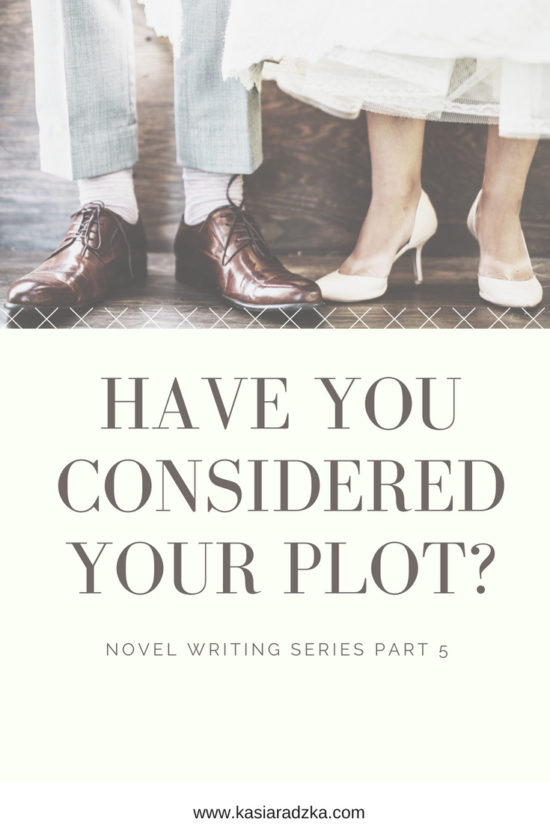
How do you create a winning plot for your book that will entertain readers and sell books by the millions?
Hmm, Russell Blake, Stephen King, Bella Andre among others have figured it out, and they are making a living doing what they love: Writing.
You can too.
What do these authors have in common?
- They write in genre fiction.
- They write in a specific category that they stick to and improving on their writing with each book.
- They tell good stories.
- They create high stakes.
- They are entertaining.
- Their stories keep you at the edge of your seat or up till dawn when you realise you have to get up for work within the hour.
But it’s so hard to find something original.
Remember: there are probably no more original plot ideas.
Most stories have been told time and time again. Your job is to take a used idea and make it original again by giving it your own slant.
Boy meets girl, they fall for each other, obstacles get in the way that prevent them from being together, finally, they find their way back to each other.
Sound familiar?
That’s because that’s pretty much every romance novel on the market. It’s a formula, it’s what readers expect. The devil is in the details. You can make the story your own by creating characters and settings that readers can fall in love with.
A crazed lunatic wants to destroy the world. Only one man or woman can stop him. Will she or he defuse the bomb in time and still get the girl/boy in the end?
Again, it’s been done a thousand times and it will get done a thousand more.
There are no original ideas.
There are original spins on ideas and new ways of telling them.
So don’t be worried that you’re regurgitating the same story. Ask yourself, why do you read books? What type of books do you read? What do you expect from the books you read?
I love crime thrillers. I expect a thrill ride. I expect the bad guys to cause trouble. I expect the good guys to stumble. I expect a satisfying ending where generally the bad guys lose. Pretty standard, right?
So what is a plot?
The plot answers the ‘why’ in a story.
* Why did Matti sell everything and move to the opposite side of the globe?
* Why did Rose decide to risk her life and be the first person to land on Mars?
* Why did Leo murder his neighbour?
* Why did Shelly the alcoholic join the nunnery?
Any of the above could be used to create a plausible plot.
* Matti sells everything and moves to the opposite side of the globe to escape her abusive husband.
* Rose decides to risk her life and be the first person to land on Mars to save the human race.
* Leo murders his neighbour to avenge the death of his dog.
* Shelly the alcoholic joins the nunnery to avoid going to prison.
E.M. Forster said the difference between a story is:
Story: The kind died and then the queen died.
Plot: The kind died and then the queen died because of grief.
Tightly written plots keep readers in suspense. Everything happens for a reason and is neatly tied together although you don’t always realise that till the very end.
Loose plots don’t always have a connection between the events that occur. That’s ok too as long as it makes sense to the story.
Open-ended plots finish the story without a distinct conclusion. That doesn’t make them any less satisfying than the closed structure where the plot comes to a satisfactory ending. Both are fine as long as they suit your story.
Don’t force one when the other will work better.
Creating a plot for your story may seem difficult in the beginning but it doesn’t have to be.
Come up with a character. Throw them in a difficult situation. Give them a good enough reason to get out of it/overcome it/achieve it. Then write your story.
Do you find plot creation easy? How do you come with plots for your books?
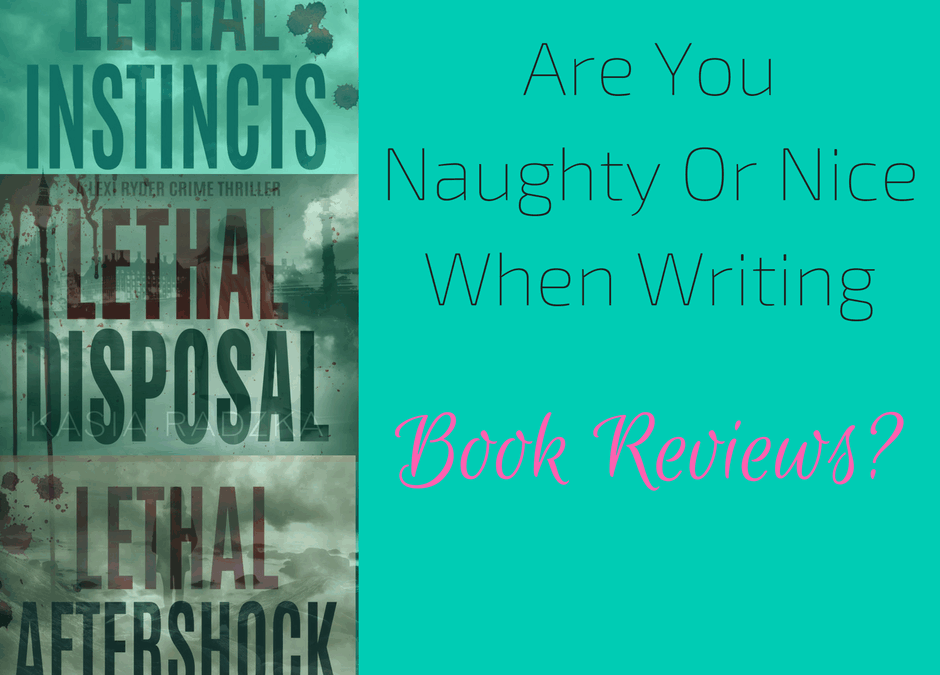
by Kasia | Oct 14, 2016 | Writing
Do you leave book reviews of your favourite books on Amazon or Goodreads?
I have a love and hate relationship with book reviews.
I enjoy reading them to get an idea of what people think of the same book that I just finished reading or a book that I plan to buy.
What surprises me the most is how nasty people become when they are reviewing books online vs in person.
It’s like all emotion, empathy and decency gets thrown out the window and anything goes when they’re sitting in front of a keyboard and screen.
It’s rude. It’s sad. It’s just plain nasty.
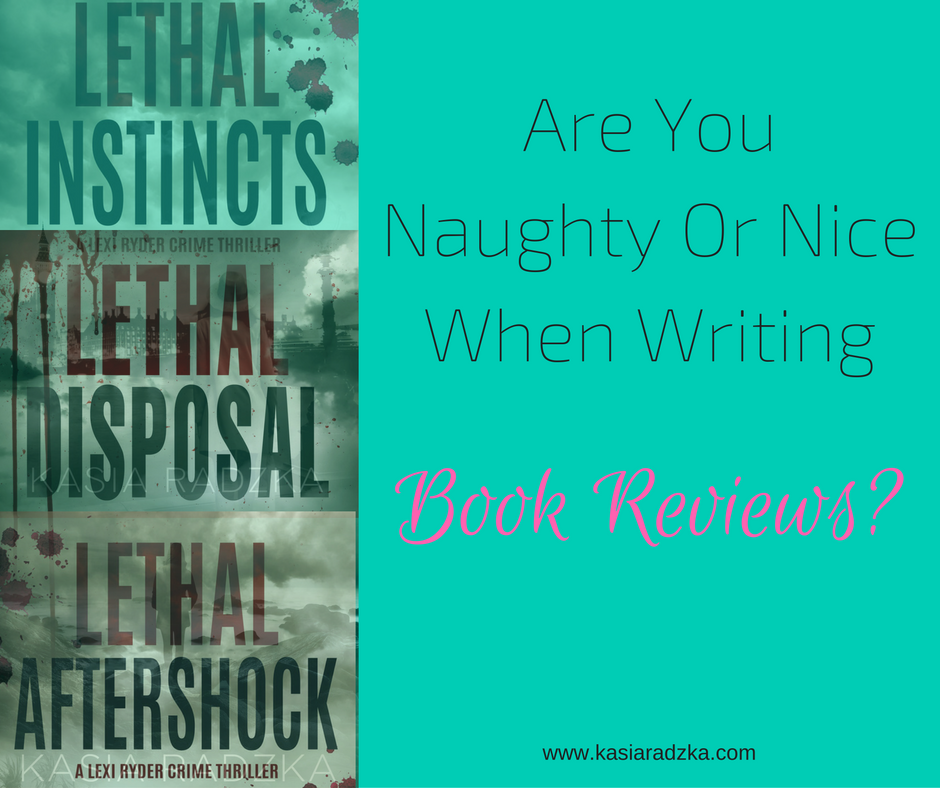
The Internet has brought the world a lot of good but it has also allowed people to bring out their claws. If they can’t see you, or they don’t know you, they feel that they can say anything they want.
What they don’t realise is there is another person at the other end.
Have you heard the saying that goes something like this, nine people will say awesome things about your book or product and then one will diss it, abuse it, and tell you you’re stupid. Who are you going to listen to?
Yep, the one little person who felt it was ok to kick in the guts and make you feel like shit.
I’m not saying we shouldn’t be honest in our reviews. Honesty is a dying trait. Be honest. But it doesn’t mean you have to be a pompous ass about it.
Reviews are awesome as it allows us to share our opinions with the rest of the world. And that’s fine. That open communication is great to engage within your community and the world.
It’s an opportunity to converse and debate with people from around the globe on similar interests. It’s a great way to make online friends and build platforms.
If you’ve written a book or sold a product or even write a regular blog you are going to get reviews of some form. For a book it might be on Amazon, Goodreads or a review blog. A blog or product might get reviews on a review page, Amazon or in the comments section of your blog.
Sooner or later you’re going to get hit with a nasty comment.
Have you had one before?
I have.
It felt like a kick in the guts. I couldn’t breathe. My stomach hurt. I wanted to throw up. I wanted to curl up in a tiny ball and hide in a dark room for eternity.
I didn’t bother listening to the comments that sang praise.
Stupid right?
Yes and no.
Both good and bad reviews have their place. But there is a difference between constructive criticism and plain-old nasty.
Which one do you sway towards?
Some people take pleasure in making others feel like shit.
Do you know what I’ve noticed about them?
Often these are the people who are not happy with their own lives, jobs, partners, friends, relationships, weekends.
So they take it out on others.
But you don’t have to be one of them. Nor do you have to listen to them.
As a reader and a writer you might feel inclined to leave a review to voice your opinion. If it’s an angry one give yourself a moment to assess your thoughts and ask yourself why the book or product makes you feel that way.
Cool down and think twice before hitting publish. There is an actual living, breathing, lovely person sitting on the other end.
Until I published my first book I didn’t really bother with reviews. I figured others could leave them, they didn’t need my opinion added to the mix.
But leaving reviews is good. It’s supportive of the writers or products you love (and sometimes don’t).
When there are mixed reviews it gives the next person contemplating buying the product to get a balanced perspective and make up their mind about the stated pros and cons. It helps them make a more informed decision.
I read a lot. I try to get through one to two books per week. Some of these are recorded on Goodreads if you want to check out what I’ve been reading lately.
I’ve even left reviews. With one caveat.
I will only leave a review if I think the book is at least 3 stars. I don’t want to leave bad reviews or dishonest ones. So If I don’t review a book it’s usually because I don’t rate it high enough.
Sometimes though if I’m not familiar with a genre and the rules of that genre I will not leave a review unless I really loved the story. I don’t think it’s fair to the writer.
What do I look for in books?
Engaging plot
Easy to read writing
Interesting characters
Good dialogue
More action less description
Spelling & Grammar
Have you noticed I haven’t mentioned grammar and spelling? While these are important, they are the last thing I consider when leaving a review.
I had a kind enough person email me once telling me they liked my story and saw potential in my writing but would not leave a review because they found too many spelling and grammar mistakes in the book.
That’s fair enough. I’m grateful for their honesty and decency although my first reaction was not so – I took a moment and tried to take emotion out of the equation – hard but not impossible.
After that, I went through a hard copy of my book with a red pen and fixed everything up. I also changed editors.
Genre
Certain genres have certain rules.
Crime books for example general end up finishing with the bad guy in handcuffs or something equivalent.
Romance novels most often than not have a happy ending where the hero and heroine end up together (after many obstacles) and live happily ever after.
Yet reviewers still can’t help themselves and say ‘That was so (*&^ing predictable.’
Yes it was. Romance readers want a happy ending and they want the two main characters to snog at the end just as crime readers want to make sure the good guys always win.
Some books break the rules, often these are cross genre ones. But you have to know the rules to break them and understand the different genres.
Should you leave book reviews?
Yes. Yes. Yes.
But be nice. You’re reviewing a persons work. Sometimes it’s the most important thing to them. Something they’ve worked all their lives towards and has taken a lot of courage to put out in the world.
Their first book might not be the best, yours probably wasn’t or won’t be either. But with enough encouraging reviews they might keep going, keep improving and then one day on their seventh (think Hugh Howey’s Wool) or twelfth book they might hit the right spot and sell a gazillion copies.
Think of your favourite authors. Have you read some of their initial work?
We all have something to learn. We can use reviews to improve our writing and our reading.
Just remember, that your review is just your opinion. There are over seven billion others that could be different from your own.
If you see a ton of mistakes in a book but enjoyed the story why not write an email to the author and explain to them that the book was good but because of the errors you aren’t inclined to leave a review. That’s fine. At least they are aware of the problem and the ball is in their court to fix it.
What really frustrates me is when a reviewer will find three spelling mistakes in a 100,000 word novel and give a bad review. Or they think that an urban fantasy genre is unrealistic. Hmm, vampires, werewolves and faeries are the creations of our imaginations, they aren’t meant to be realistic.
If you’re a reader, think twice before leaving a bad review. People read them. They get hurt by them. Sometimes they give up because of them.
If you’re a writer, don’t take all the reviews to heart but do read them with an open mind. A few might be telling you something. Use reviews to improve your books and to grow as a writer. You want each book to be better than the one before it, don’t you?
Leave a review. It’s one of the ways you can support authors and encourage better writing.
Do you leave book reviews? Have you received one that made you want to give up?
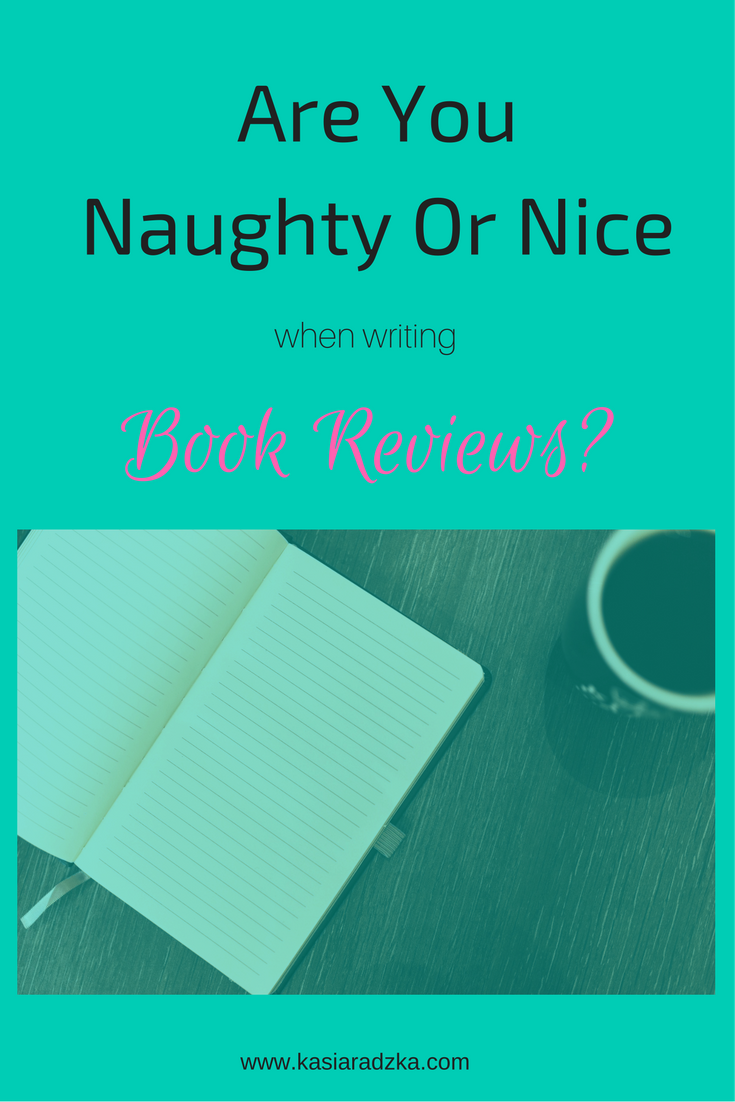
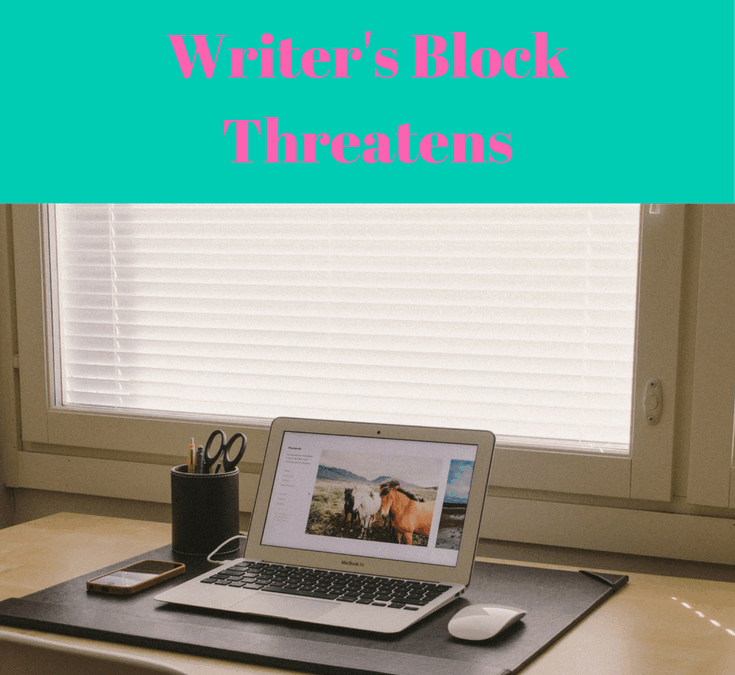
by Kasia | Oct 11, 2016 | Writing
Writer’s block. I don’t believe it. The only time writer’s block hits is;
1 – When your story isn’t working
2 – Not enough knowledge/research about a subject
3 – Writing without an outline/plan
4 – Lost interest
One of the most important tools and talents of a writer is the the never-ending well of ideas that rests on their shoulders, or hides inside their brain. Writers are strange people, they like to watch and use their observations in their stories, they are curious about people’s behaviours, choices and attitudes. They often stare into space or read a book for hours and call it working.
Working it is. That is one of the joys of being a writer.
Unfortunately, your significant other might not understand this at all.

If you’re feeling stuck, here are a few ideas to get your going again.
Do you need an idea for a short story or a novel?
Play the ‘what if’ game.
1. What if you discovered that your neighbour was an assassin for hire?
2. What if your dog started talking to you?
3. What if you woke up to find yourself in the middle of a war zone?
4. What if you decided to pack just a suitcase and move to Morocco?
5. What if you came home to find a goodbye note?
6. What if you left leaving just a goodbye note?
7. What if the people on the train were zombies?
8. What if you won the lottery and gave it away the next day?
9. What if you won the lottery and went on a crazy spending spree?
10. What if you couldn’t read or write but had to finish school?
11. What if you witnessed a crime in a dark alley?
12. What if your mum was a mob boss?
13. What if scientists discovered a cure for all diseases and refused to let it out in the open?
14. What if the government made a law against people owning cameras?
15. What if the military took control of your city?
You can play the what if game with just about anything to get your mind stirring. Pick any idea or work your way through the list and see what or if any story emerges. Combine ideas for more compelling and interesting stories. See what works, see what doesn’t.
What ‘what ifs’ can you come up with? I find this exercise great to do whilst reading the newspaper or watching a movie. Ideas are triggered by scenes, dialogue and situations I encounter throughout the day. That’s why it’s important for writers to always have something to scribble on when that idea pops to mind. Funnily enough, many of my ideas pop up in the middle of the work day when I should be concentrating on numbers rather than story telling!
Write a short story using the following elements:
1. A butler, a monkey, a basement and loss.
2. A priest, a dog, a casino, and love.
3. A soldier, a unicorn, a car and honesty.
4. A teacher, an elephant, a train and gratitude.
5. A homeless person, a gold fish, a school and passion.
6. A cop, a baby, a theatre, and faith.
These are just meant to get you thinking. Sometimes you might get a full story out of them, other times just a kernel to get you going with your own writing. Stretch your writing muscles and your imagination will always be on your side, the muse will show up and you won’t have enough time to get all the ideas on paper.
That’s great for when you’re writing fiction but what about non-fiction like blog posts and articles?

There are ways to never run out of ideas, here’s just a few:
1. Grab a magazine and check out the headlines. Can you twist them around?
Write with the opposite point of view.
- Turn 5 Foods That Will Blast Off The Fat to 5 Foods That Will Make You Fat.
- How To Get More Sleep Each Night to How To Function With Only 5 Hours of Sleep Per Night
- Why You Should Run That Marathon To Why Running A Marathon Is A Bad Idea
2. How about slanting one story idea for different audiences?
If you’re writing about a top on productivity you could write several articles aimed at a different audience. Of course you don’t want to plagiarise yourself. You can use similar research but the article itself needs to be original. You’re simply repurposing the idea for multiple markets. Less work whilst increasing your bottom line.
3. What do you really terrible at?
Start making a list. Be honest with yourself. There’s bound to be two or three things you’re not very good at.
So you hate investing. Is there a way you could change that around by learning about it and writing articles or blog posts about your journey to investing zen?
- Investing 101: What the hell does investing mean anyway?
- How to save money when you’re broke
- Shares: Why I Want To/Never Want To Invest In Them
4. What about the things you would love to learn?
One of the awesome things about being a writer is the constant self-education. You don’t have to write what you know, instead write what you don’t know to expand your knowledge and fill up your creative well.
Have you a passion for food?
Chat up a chef or waiter and see if they are willing to dish the dirt on restaurants and food in the area. Can they explain to you the different between julienning and cutting? Maybe share a secret ingredient that adds spice to any meal? What do they predict to be the up-and-coming meal/fruit/dessert?
5. Where’s your bucket list?
Do you have a bucket list? These days many people do and they flaunt it all over the place. If you don’t, now’s a good time to start making one. Once you’ve got it down on paper, is there anything that you could get started on now? Great, get going and then write about your experience.
6. What’s your qualification/day job?
If you studied or are studying, worked or are working, you have something to write about.
Focus on your knowledge areas. Just because you know the difference between calories and kilojoules or HTML and CSS code doesn’t mean every one else does. There’s ample opportunity to write on topics from horses to dental care and beyond.
How many article ideas can you come up with based on your day job or qualification?
Writer’s block doesn’t have to be a curse. It’s usually just a sign that something isn’t working. Here are just a few other things you can do:
- Take a step back and reassess your work.
- Ask yourself what you want your story to say.
- Write without censoring yourself.
- Forget perfection, just get it written.
Do you ever suffer from writer’s block? How do you overcome it?

















